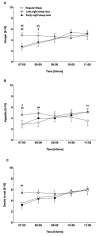Late, but Not Early, Night Sleep Loss Compromises Neuroendocrine Appetite Regulation and the Desire for Food
- PMID: 37432152
- PMCID: PMC10181094
- DOI: 10.3390/nu15092035
Late, but Not Early, Night Sleep Loss Compromises Neuroendocrine Appetite Regulation and the Desire for Food
Abstract
Objective: There is evidence that reduced sleep duration increases hunger, appetite, and food intake, leading to metabolic diseases, such as type 2 diabetes and obesity. However, the impact of sleep timing, irrespective of its duration and on the regulation of hunger and appetite, is less clear. We aimed to evaluate the impact of sleep loss during the late vs. early part of the night on the regulation of hunger, appetite, and desire for food.
Methods: Fifteen normal-weight ([mean ± SEM] body-mass index: 23.3 ± 0.4 kg/m2) healthy men were studied in a randomized, balanced, crossover design, including two conditions of sleep loss, i.e., 4 h sleep during the first night-half ('late-night sleep loss'), 4 h sleep during the second night-half ('early-night sleep loss'), and a control condition with 8h sleep ('regular sleep'), respectively. Feelings of hunger and appetite were assessed through visual analogue scales, and plasma ghrelin and leptin were measured from blood samples taken before, during, and after night-time sleep.
Results: Ghrelin and feelings of hunger and appetite, as well as the desire for food, were increased after 'late-night sleep loss', but not 'early-night sleep loss', whereas leptin remained unaffected by the timing of sleep loss.
Conclusions: Our data indicate that timing of sleep restriction modulates the effects of acute sleep loss on ghrelin and appetite regulation in healthy men. 'Late-night sleep loss' might be a risk factor for metabolic diseases, such as obesity and type 2 diabetes. Thereby, our findings highlight the metabolic relevance of chronobiological sleep timing.
Keywords: appetite regulation; ghrelin; healthy men; leptin; sleep loss; sleep timing.
Conflict of interest statement
The authors declare no conflict of interest.
Figures


Similar articles
-
Chronobiological aspects of sleep restriction modulate subsequent spontaneous physical activity.Physiol Behav. 2020 Mar 1;215:112795. doi: 10.1016/j.physbeh.2019.112795. Epub 2019 Dec 23. Physiol Behav. 2020. PMID: 31874180 Clinical Trial.
-
A single night of sleep deprivation increases ghrelin levels and feelings of hunger in normal-weight healthy men.J Sleep Res. 2008 Sep;17(3):331-4. doi: 10.1111/j.1365-2869.2008.00662.x. Epub 2008 Jun 28. J Sleep Res. 2008. PMID: 18564298
-
Short-term sleep loss decreases physical activity under free-living conditions but does not increase food intake under time-deprived laboratory conditions in healthy men.Am J Clin Nutr. 2009 Dec;90(6):1476-82. doi: 10.3945/ajcn.2009.27984. Epub 2009 Oct 21. Am J Clin Nutr. 2009. PMID: 19846546
-
Effect of sleep duration on dietary intake, desire to eat, measures of food intake and metabolic hormones: A systematic review of clinical trials.Clin Nutr ESPEN. 2021 Oct;45:55-65. doi: 10.1016/j.clnesp.2021.07.029. Epub 2021 Aug 21. Clin Nutr ESPEN. 2021. PMID: 34620371
-
Role of sleep duration in the regulation of glucose metabolism and appetite.Best Pract Res Clin Endocrinol Metab. 2010 Oct;24(5):687-702. doi: 10.1016/j.beem.2010.07.005. Best Pract Res Clin Endocrinol Metab. 2010. PMID: 21112019 Free PMC article. Review.
Cited by
-
Hypoglycemia Unawareness-A Review on Pathophysiology and Clinical Implications.Biomedicines. 2024 Feb 8;12(2):391. doi: 10.3390/biomedicines12020391. Biomedicines. 2024. PMID: 38397994 Free PMC article. Review.
-
Sleep habits in the pathogenesis and management of diabesity.J Diabetes Investig. 2025 Jul;16(7):1202-1216. doi: 10.1111/jdi.70075. Epub 2025 Jun 1. J Diabetes Investig. 2025. PMID: 40452148 Free PMC article. Review.
-
The impact of REM sleep loss on human brain connectivity.Transl Psychiatry. 2024 Jul 2;14(1):270. doi: 10.1038/s41398-024-02985-x. Transl Psychiatry. 2024. PMID: 38956035 Free PMC article.
-
Relationship Among Macronutrients, Dietary Components, and Objective Sleep Variables Measured by Smartphone Apps: Real-World Cross-Sectional Study.J Med Internet Res. 2025 Jan 30;27:e64749. doi: 10.2196/64749. J Med Internet Res. 2025. PMID: 39883933 Free PMC article.
-
Sleep Restriction and Weekend Sleep Compensation Relate to Eating Behavior in School-Aged Children.Nat Sci Sleep. 2025 Jul 22;17:1671-1681. doi: 10.2147/NSS.S509636. eCollection 2025. Nat Sci Sleep. 2025. PMID: 40727380 Free PMC article.
References
-
- Ng M., Fleming T., Robinson M., Thomson B., Graetz N., Margono C., Mullany E.C., Biryukov S., Abbafati C., Abera S.F., et al. Global, regional, and national prevalence of overweight and obesity in children and adults during 1980–2013: A systematic analysis for the Global Burden of Disease Study 2013. Lancet. 2014;384:766–781. doi: 10.1016/S0140-6736(14)60460-8. - DOI - PMC - PubMed
Publication types
MeSH terms
Substances
Grants and funding
LinkOut - more resources
Full Text Sources
Medical

